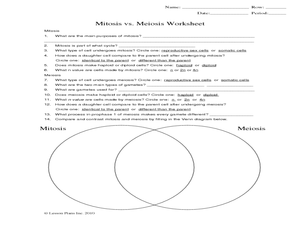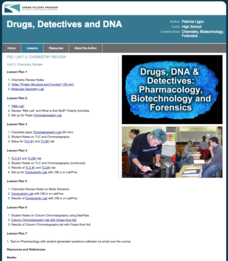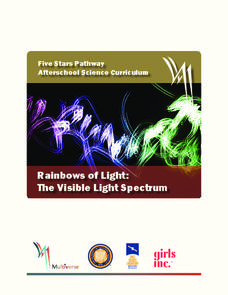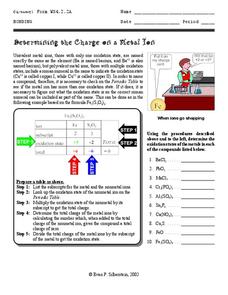Curated OER
Mitosis vs. Meiosis Worksheet
This complete worksheet includes short answer and multiple choice questions as well as a Venn diagram for comparing and contrasting mitosis with meiosis. Separate teachers' instructions are supplied. This could be used as homework and is...
Curated OER
Understanding the Cosmic Microwave Background (CMB)
How did our universe really begin? Explore the Science Big Bang Theory and Cosmic Microwave Background (CMB) with this multiple activity-based lesson that demonstrates that the increase of density due to the decrease of temperatures,...
Curated OER
Volcanic Activity in the U.S.
Young scholars locate and map ten volcanoes in United States, create chart comparing volcanoes by last eruption, type of volcano, location, and interesting fact, and create Powerpoint slide show describing basic
information about...
Kentucky School for the Deaf
Levels of Organization within an Ecosystem
From tiny organisms to entire biomes, young scientists examine the interdependent relationships tying all living and non-living things together with this collection of ecology resources.
Curated OER
Simple Machines III - Pulleys
The principles behind pulleys, levers, and simple machines are the focus of a science instructional activity. In it, learners take part in a whole-class activity. There are two groups of pupils who each must lift objects with fixed...
Kenan Fellows
Unit 2: Chemistry Review
What exactly goes into the medications people take every day? Scholars learn about the chemistry of medications in the second of a four-part series on Pharmacology. Over the course of two weeks, class members complete seven experiments,...
Lerner Publishing
Teaching Habitats
What makes up a habitat? Use this resource to engage first graders in the exploration of desert, wetland, forest, and ocean habitats. Youngsters classify plants and animals into the four distinct habitats through drawings and cutting and...
Multiverse
Rainbows of Light: The Visible Light Spectrum
Rainbows can teach us about the visible light spectrum. Learners observe multiple items that clearly display a rainbow to develop better connections. The lesson then explains wavelength using a rope to make waves.
Curated OER
Unit 0 Review - Measurement Lab Equipment
Review questions like these can be used in your biology, chemistry, physics, or earth science classes! They assess scientists' understanding of laboratory measurement tools including graduated cylinders, thermometers, and balances. They...
Biology Corner
Random Sampling
Simulate a random sampling of data by tearing 20 sheets of paper into slips and place a number on 10 and a letter on 10. They place the slips in two separate containers and randomly draw a number and a letter. They record their...
Curated OER
Significant Figures Worksheet #1
In this significant figures worksheet, students solve forty eight problems. They identify significant figures in numbers, they complete calculations of addition and subtraction and identify significant figures, they multiple and divide...
Curated OER
Theory of Plate Tectonics
For this plate tectonics worksheet, student answer 15 multiple choice questions about plate movement, types of boundaries, collision of plates, continental plates, and the lithosphere.
Curated OER
The Periodic Table
In this periodic table worksheet, students review the elements and how they are organized in the periodic table. This worksheet has 10 fill in the blank, 6 multiple choice, and 5 short answer questions.
Curated OER
Structure of the Atom
In this atom worksheet, students review the structure of an atom. Students also explore radioactive elements and quarks. This worksheet has 10 fill in the blank, 6 true or false, 1 short answer, and 3 multiple choice questions.
Curated OER
Simple Machines III - Pulleys
Fourth graders are introduced to a spring scale to show that the forces on both sides of the pulley are the same. They break into groups to lift objects with fixed pulleys and with multiple looped pulleys and then measure the force...
Curated OER
Wheel of...Geology!
Students participate in a group review activity in order to prepare for an exam. Students study together in their teams prior to the review activity. During the game, the teacher spins a wheel with subject categories written on it and...
Curated OER
Basic Units of Life
For this cells worksheet, students will review vocabulary words and information relating to the structure and function of plant and animal cells. This worksheet has 10 crossword puzzle questions, 6 multiple choice, 4 short answer...
Curated OER
Electromagnetic Waves
In this electromagnetic waves activity, learners review the different types of electromagnetic waves. Students also compare and contrast light and sound waves. This activity has 10 fill in the blank, 5 multiple choice, and 6 short answer...
Curated OER
Machines
In this machines instructional activity, students review different types of simple machines including pulleys, wedges, levers, and inclined planes. This instructional activity has 10 matching, 4 multiple choice, and 8 short answer...
Curated OER
Sound and Hearing
In this sounds worksheet, learners will review how sound is created by vibrations. Students will understand what creates vibrations and how the ear receives those sound waves. This worksheet has 10 fill in the blank, 9 multiple choice, 1...
Curated OER
Moving the Body
In this musculoskeletal system worksheet, students review the function of bones and muscles in this body system. Students also review the different types of muscles: smooth, skeletal, and cardiac. This worksheet has 10 fill in the blank...
Curated OER
Determining the Charge on a Metal Ion
In this metal ion worksheet, students follow the steps to determine the oxidation states of the metals in each of the given compounds. Students complete 10 problems.
Curated OER
Erosion Patterns
Fifth graders explore erosion and the different types of sediment. In this erosion patterns lesson students complete an activity and divide into groups and conduct an experiment.
Curated OER
Light and Vision
In this light and vision worksheet, learners will review the characteristics of light including how the eyes use light to see. This worksheet has 9 fill in the blank, 8 true or false, 9 multiple choice, and 1 short answer question.























